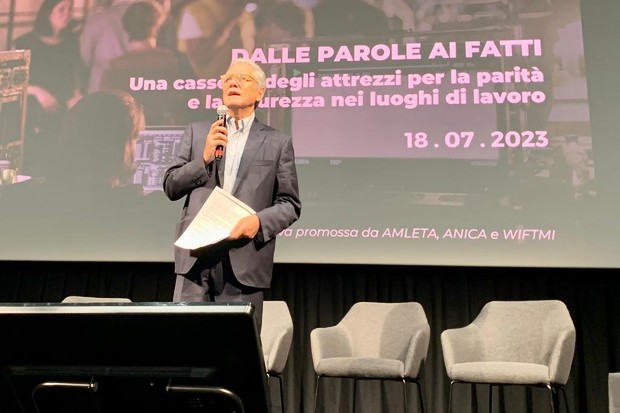Industry / Market - Italy
Industry Report: Gender Equality, Diversity and Inclusion
ANICA has signed up to Women in Film, Television & Media Italy's Charter of Ethical Behaviour for the Audiovisual Sector
The charter is a tool for the prevention of sexual harassment, intimidation and all forms of discrimination, gender-based violence and body shaming in the workplace and on film sets

ANICA has announced that is has signed up to the Charter of Ethical Behaviour for the Audiovisual Sector as devised by WIFTMI - Women in Film, Television & Media Italy, a tool for the prevention of sexual harassment, intimidation and all forms of discrimination, gender-based violence and body shaming in the workplace, including film sets, and to protect the dignity of the individual, of workers and of students in the audiovisual sector.
The announcement was made by ANICA Chairman Francesco Rutelli while opening the meeting entitled "From words to action. A toolkit for equality and safety in workplaces", which took place on Tuesday 18 July at the association’s headquarters. Rutelli described their commitment to the charter as “a first serious, crucial and credible step towards caring for the wellbeing of people working in all areas of the audiovisual industry. We cannot tolerate direct or indirect forms of power abuse, arrogant or intrusive behaviour, or inappropriate relationships. Sexist approaches to power management are still an issue today, and the exertion of power through humiliation - especially the humiliation of women - must be nipped in the bud by introducing free and creative ways of working”.
“We’ve got to where we are today thanks to the press conference in early 2023, where the Associazione Amleta, which represents actresses, denounced the problem of violence, numbers in hand”, stated ANICA’s General Secretary Francesca Medolago Albani. “And we’re here now because ANICA feels a sense of responsibility to contribute, alongside all the other collaborators, in order to ensure companies working in the sector have access to tools for the prevention, identification and management of these problems. Many firms are already leading the way on this, but we need to make sure that all businesses engage in appropriate behaviours in the easiest way possible”.
As explained by Amleta’s Chair, Cinzia Spanò: “In the past three years we have gathered together 223 spontaneous reports, but we know that almost all Italian actresses have experienced violence and harassment, or they have chosen to act preventatively by turning down a job because there wasn’t a safe environment. 93% of victims of violence or harassment are women. 99.9% of those found guilty of violence or harassment are men. Of these, 41% are directors, 15% actors and 8% producers. Devastatingly, these guilty parties also include teachers”.
“In order to understand the extent of this phenomenon, we should think of an iceberg: above the water we see femicide, violence and the most serious kinds of harassment”, explained Domizia De Rosa, the chair of WIFTMI - Women in Film, Television & Media Italy. “But if we look below the water-level, we see cultural factors and, ultimately, language. Words are important in that they’re both a symptom and a consequence. Workplaces must be welcoming, inclusive and safe at both a physical and a psychological level, even more so in the case of workplaces in the creative industries, such as the audiovisual sector. These should be places of ‘creative intimacy’ where working in freedom and safety is essential in order to best express individual creativity”.
A recording of the meeting together with the afore-mentioned documents and materials will shortly be available on the Amleta, ANICA and WIFTMI websites, as well as on those of organisations wishing to contribute towards content disclosure and raising awareness and collective responsibility.
For further information on the WIFTMI (Women in Film, Television & Media Italy) Charter for Ethical Behaviour for the Audiovisual Sector, click here.
(Translated from Italian)
Did you enjoy reading this article? Please subscribe to our newsletter to receive more stories like this directly in your inbox.















